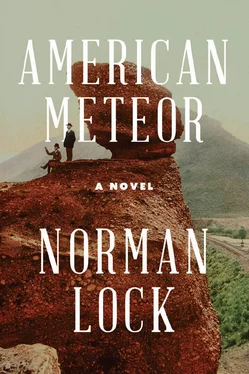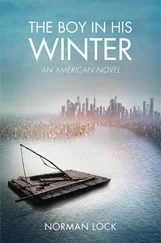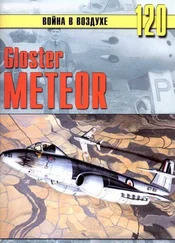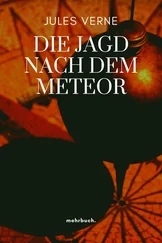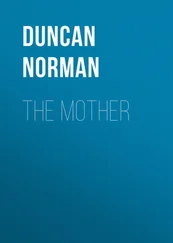“Never. Seems a subject more in line with the authors you favor. Perhaps in the morbid imaginations of Poe or Hoffmann you might find such a notion. A dose of salts would have done them both good. And you, too.”
I never put much stock in salt.
“If you’re ribbing me about my shares in Lincoln’s salt wells, you needn’t bother.”
I don’t mean to smile, Jay.
“If you’d told me you were in contact with a fortune-teller, I wouldn’t have taken a bath. Damn it, you remember the surveyor’s report: ‘There is no question of the vast wealth that will someday be derived from this region.’ Lincoln salt was supposed to be finer and more plentiful than Syracuse’s!”
Whiskey need refreshing?
“I won’t say no. You shouldn’t be drinking, Stephen. Not with your heart.”
Just half a jigger.
“You’ve got the heart of a man twice your age.”
That would make me a hundred and six. And more than likely dead.
“My point exactly. But I won’t lecture you.”
I’ve learned that the most determined hearts can be undone by a small thing. It might as well be a shot of bourbon as a bullet.
“Well, aren’t you going to tell me about the Mexican kid?”
Sorry, I seemed to have jumped the track. In those days, it was my habit to explore the countryside whenever we were stopped for any length of time. So when the train put into Lamy — a fly speck on the map — to repair the boiler, I hired a mule and went out onto the desert to take pictures. You’ve never been in New Mexico, have you, Jay?
“I’ve never in my life been south of Kansas City.”
The desert’s worth seeing.
“So I’ve been told.”
In the desert, there’s a drought of water, and there’s also a dearth of light when the sun is swallowed by piling clouds and the thorn trees, the cactus, the sedge grass are quenched. They appear to die the instant the light goes out of them, but although they wither, turning brown and brittle, they’re only dormant, because they hold within themselves water and also light — maybe no more than a symbol’s worth of both, but enough. And when the rain comes, the trees, bushes, and grass vivify; and when the dark clouds go, they shed their radiance once again. Jackson used to say that what the photograph can do better than the human eye or an artist’s hand is to render the austerity of the world, which is the place to look for the world’s purpose and meaning. And I’ve found no greater austerity than in the desert.
“The girl, Stephen.”
I found her sitting by the body of a dead Mexican. She was cried out and nearly dead herself with thirst. The man — he was her father — had been shot through the chest. His serape was stained with the rust of dried blood, and his big mustache was stiff with it. She looked to be four or five years old. I gave her water and a little food, and when she could speak, she told me two men had shot her father and taken his horse and saddlebag. My Spanish isn’t the best, and when a spate of Mexican would bubble up from her, I couldn’t follow. From what I was able to understand, her mother had died of fever the day before, and her father had been taking her to stay with an aunt. I couldn’t discover where the aunt lived; I suppose the girl didn’t know herself. I climbed to the top of a hill bristling with acacia, but I could see nothing except more desert. So I thought it was best to take the girl, whose name was Carmelita, back with me to Lamy.
“You couldn’t very well have left her there.”
The thought crossed my mind, like a drop of vinegar in milk or a fly on a cake. The brain can conceive of such horror, Jay!
“ ‘An imp of the perverse.’ We’re all prey to them.”
I suppose so.
“What happened when you got to town?”
I left her at the mission church.
“A sensible thing to do.”
And then, a little while later, while they were stoking the locomotive boiler, I went back for her.
“What in heaven’s name for?”
I don’t really know. Unless I was ashamed: They say the thought is father to the deed.
“What would you have done with a five-year-old Mexican?”
Taken care of her, I guess. I wasn’t thinking. I put her to bed in the mail car, where I’d made a kind of parlor for myself, and waited for the train to go on to Albuquerque. By the time we arrived, I’d realized the impossibility of keeping her. I knew nothing about children. I knew nothing about Mexicans. I was living on a train.
“You were living in a dream.”
When we got to Albuquerque, I left her with the sisters.
“Just as you should have. Drizzle a little water in my drink, will you?”
The next time we laid over in Albuquerque, I went to visit her at the mission. They told me she’d died of a fever not long after I’d left her there.
“More than likely, the same that took her mother. Yellow fever, malaria — there was nothing you could have done.”
Crazy Horse said, “White men want acorns without the oak tree.”
“I’ve got no time for mysticism, Stephen. Not Swedenborg’s or even Emerson’s, and certainly not a bloodthirsty Indian’s.”
You don’t believe Crazy Horse came to me in my dreams?
“Frankly, no, but it’s entertaining as all hell, though I do wish you’d hurry up and finish. You tell a story like a cancan dancer lifting up her skirts.”
I remember how he stood and pointed into a distance that had no end or horizon but seemed to go on and on. My eyes — I had two of them in my dream — became tired and burned, and I would have closed them or looked elsewhere, but there was no turning away from it. Just as Jackson had done, Crazy Horse was teaching me how to see the world for what it is — for what it will be one day.
“God Almighty, Stephen! You should go on the stage.”
I saw the Great Plains divided and subdivided by boundary lines, railroad lines, telegraph lines, and the lines of instruments not yet dreamed of. Paths trampled underfoot by Indians and bison, emigrants and their cattle became roads of gravel, macadam, asphalt, and concrete. The bison passed into history, and so did the ancient people of the Great Plains and of the continent — passed into folklore and ethnology, as curiosities and relics of an age when time and the land had yet to be apportioned. Other species of animal and vegetable life also were extinguished by poisons that dropped from the sky and rose up like dust from the earth and fell into the waters of the rivers and their tributaries, the lakes, and even of the sea, where great whales sang of their misery and oysters crowding the shorelines sickened and shriveled and all manner of fish and the life that gave them sustenance perished from the earth. I saw crops fail and the grass disappear from the prairies and the loam crumble to dust, and I saw the dust blown upward into a brown and turbid atmosphere, which darkened the Great Plains and the lungs of the people living there— coiling and uncoiling its atoms until even the cities of the East grew dark beneath the pall. And birds, whose delight it was to slip through the clear skies, like a needle through cambric, and at the end of the day to rest in the trees or in the tall grass, singing to our delight the canticles of plenty — one by one, they fell silent, the furnace glowing within each small breast put out. That was the final dust storm, when rock was scoured of soil by wind and the inexhaustible aquifers beneath it were emptied and the sweet noise of water became like the dry cough of seeds rattling in an empty gourd. The Great Plains now resembled the Sahara, and roofs and steeples sown thickly on the East Coast and on the West had vanished beneath dead oceans chilled by floes that, since the beginning of time, had been like shingles on the roof of the world — chilled and then warmed by the enraged sun, which reigned without softness or mercy over earth’s toppled kingdoms.
Читать дальше
